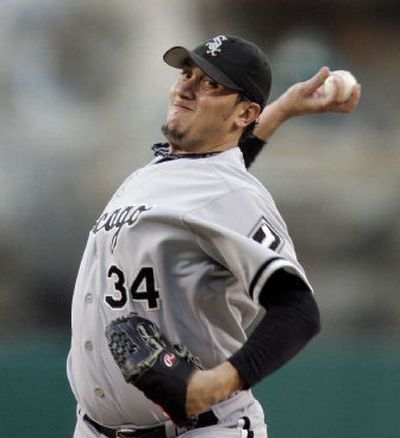Garcia’s come a long way

CARACAS, Venezuela – No one played baseball in the street outside Freddy Garcia’s childhood home. It was too steep, at least a 45-degree angle straight up “to heaven,” according to his father.
So Garcia and his pals found other fun, like downhill racing atop plastic beer crates that slid along the pavement. It may have been in one of those races that Garcia broke his pitching arm as a kid, although his dad says he never knew the real story.
Garcia, the White Sox’s starting pitcher in World Series Game 4 tonight, grew up a poor kid in a hilltop barrio in Caracas. But he also got an early look at the other side: He caddied at a ritzy golf club at the bottom of the hill, and that’s where he learned to hit the tee shots that help him beat his current golfing buddy, Ozzie Guillen, the White Sox’s manager.
“Ooooooh, he could play,” said his father, Freddy Garcia Sr., 46, who now lives in one of the nicest houses in the barrio.
Garcia’s humble beginnings are typical of the increasing number of Venezuelan major-leaguers. But the 6-foot-4-inch right-hander, 29, is also the prototype of the bigger player now coming out of Venezuela, throwing fastballs, hitting homers and erasing the idea that the nation only produces Aparicios, Vizquels and Guillens.
As he grew and grew as a kid, Garcia showed early potential. But he also had to learn to work hard and benefited from baseball’s increased emphasis on developing and conditioning prospects before sending them north to spring training.
Garcia was signed in 1993 by Andres Reiner, 70, a Hungarian-born scout working for the Astros. At a tryout, Reiner first saw Garcia as a lanky kid throwing 78 mph, not in the mid-90s as he does now, and the Astros waited a year before giving him a contract.
Reiner, who lived for years in Venezuela, had persuaded the Astros to open the country’s first major-league academy. He said he battled the notion that Venezuela would produce a big-leaguer only once every 10 years. Among the 17 major-leaguers he has signed since 1989 are Bobby Abreu and Melvin Mora.
“Everybody saw the potential with Freddy,” Reiner said. “He let himself be polished, and now he is who he is. He wasn’t (a hard worker), but he learned.”
Once Garcia signed, his ascent was relatively fast. The Astros sent him to camp in the Dominican Republic, and by 1995 he played his first of four years in the minor leagues before breaking into the majors with Seattle in 1999.
That year, he won 17 games and finished second to Carlos Beltran for rookie of the year. Last year, he signed a 3-year, $27 million contract with the Sox.
Growing up, Garcia was quiet and intense, his friends and mentors say. Miguel “May” Pacheco, his Little League coach and a neighbor, said it was Garcia’s strong character and consistency that paid off for him.
“He worked and worked,” said Pacheco, 46, who still coaches Little League and recalls allowing Garcia to use his bank account when the young pitcher first signed.
Garcia’s father, a soccer player considerably shorter than his son, said the family was surprised by how Garcia had grown every time he came back from baseball camps. “We thought, ‘How big is he going to get?’ ” the father said.
Garcia and two siblings grew up in a rough cement-block home owned by his grandmother Matilde and occupied at times by more than 30 family members. His dad drove a truck. His mom was a nurse.
Several years ago, Garcia’s parents and siblings moved up and out, but not to a fancier neighborhood like many families of major-leaguers. They still live in the barrio, but in a big house that Garcia bought them and that is known by kids for blocks around.
The fame and wealth have brought security concerns. The mother of Philadelphia Phillies reliever Ugueth Urbina was kidnapped for five months last year, and many families have bodyguards. But the Garcias say they are not that worried. They say theirs is the safest barrio in the city.
“It’s really great to have a brother in the major leagues, but it’s a delicate thing,” Garcia’s sister, Elizabeth, 25, said. “There are bad people out there.”
Garcia’s father drives a taxi these days but doesn’t tell too many passengers about his son. “When I do, they don’t believe me,” he says. “I just wear the (Sox) hat for fun.”
The family traveled for the first time to Chicago at the end of the regular season, attending games there and in Cleveland and also were on hand for the birth of Garcia’s first child, Sofia, on Oct. 13. The pitcher’s wife, Glendys, is the niece of Guillen’s wife.
The elder Garcia came back amazed at Chicago and impressed with the general orderliness and the treatment the family got in the hospital. “It was really tranquil, not like (Venezuela),” Garcia Sr. said. “After the game, everybody goes on their way. In 30 minutes, it’s done and all the fans are gone.”